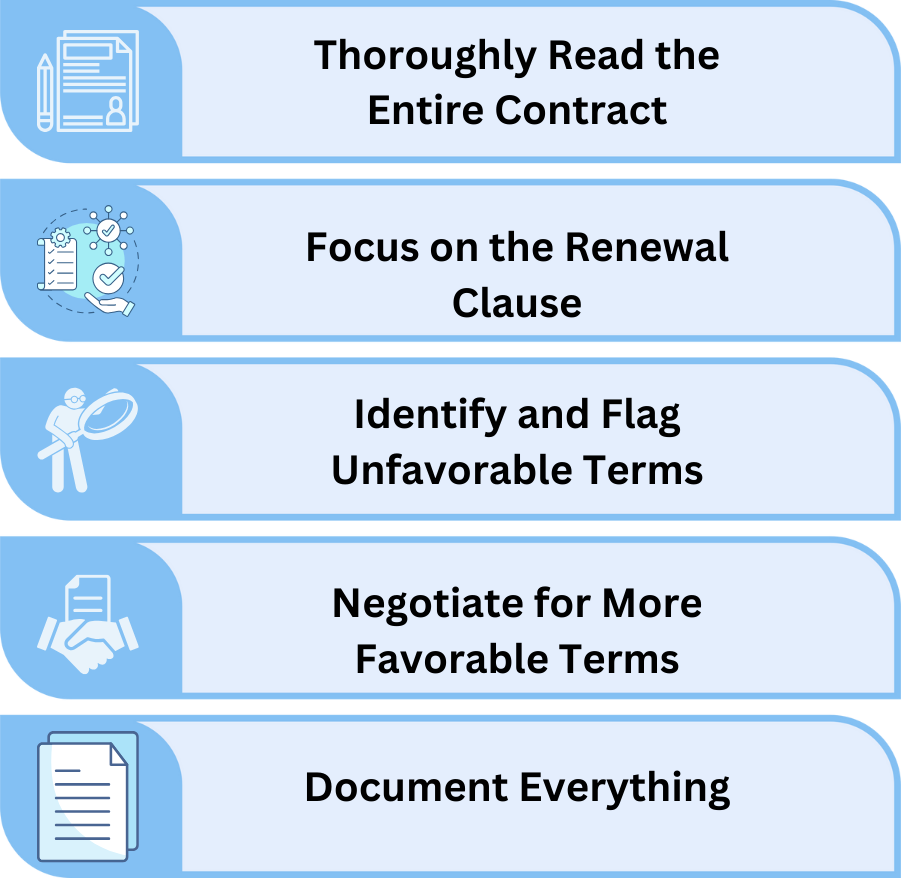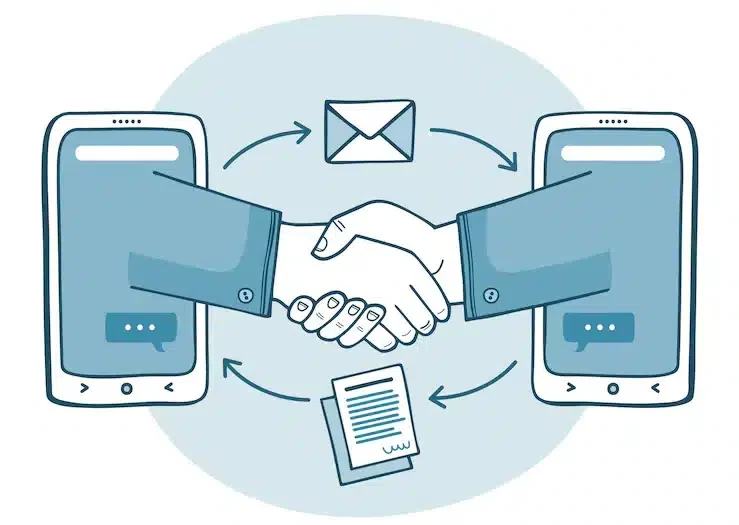Automatic contract renewal is an important part of managing contracts well. It means extending an existing contract after it reaches its expiration date. By automating this renewal process, organizations can keep their business relationships going smoothly and save time and resources.
To improve the renewal strategy, it is helpful to follow best practices. This includes reviewing contract terms, looking at performance metrics, and using automated reminders. Using contract management software can make managing the entire contract lifecycle easier. It helps reduce potential risks and keeps contracts aligned with business goals.
In this blog, we will explore all aspects of automatic contract renewal clauses. We’ll cover their definition, significance, key elements, effective drafting strategies, advantages and disadvantages, and best practices to consider.
Understanding Automatic Renewal Clauses
In today’s busy business world, contracts play a big role in many deals. One important part of these agreements can be the automatic renewal clauses. These clauses often go unnoticed but can cause unexpected issues. Even though they may seem simple, they can lead to serious legal issues. Therefore, it is very important for anyone signing contracts to understand how these renewal provisions work.
Definition and Overview
An automatic renewal clause, called an evergreen clause, is part of an agreement. It allows the agreement to automatically extend for another term after the first agreement ends. This happens without needing permission or a new signature from those involved.
In simple terms, if one party does not take action to end the agreement within a set time, it will automatically renew again. This is usually for the same length as the original agreement. This renewal process keeps going until one party decides to opt out. They often need to give written notice before the renewal date.
Related Article: What is Cost Reimbursement Contracts? A Complete Guide
The Importance of Automatic Renewal Clauses

Automatic renewal clauses are now important in many agreements. They affect both businesses and consumers. These clauses are not just legal details; they are a smart way to keep things going, simplify processes, and build lasting business connections.
Whether you are a business looking to run things smoothly, or a consumer who wants ease, it is vital to understand what these clauses mean.
Benefits for Businesses and Consumers
For businesses, automatic renewal clauses have several benefits. They help save money by lowering the time and effort spent on frequent contract changes. This keeps services running smoothly, which is good for long-term business needs. They can also lead to better deals over time.
- Uninterrupted Services: Ongoing service is important for many businesses. Automatic renewals stop any breaks in service by making sure the next contract starts without a hitch.
- Administrative Efficiency: Automatic renewals remove the need for repeatedly discussing contracts. This saves time and resources for everyone involved.
- Predictable Revenue Streams: For businesses with subscription services, these clauses guarantee a constant and steady income.
Consumers also enjoy the ease of not having to renew contracts that they find useful.
Related Article: What is a Franchise Agreement? A Complete Guide
Key Elements to Look For in an Automatic Renewal Clause

One must look at the following things while reviewing an automatic renewal clause:
- Contract period & renewal length: Check the duration of the contract and how long each renewal lasts.
- Renewal date & notice period: Identify the exact renewal date and how much notice is required to avoid automatic renewal. Ensure the notice period suits your needs.
- Contract terms for renewal: Review the terms that apply during the renewal period.
- Price increases: Look for any automatic price hikes. Are they fair and predictable?
- Changes in fees or obligations: Understand any changes in fees, services, or obligations triggered by the renewal.
Careful review prevents unexpected costs or commitments later.
Strategies for Effective Review and Negotiation

Incorporating best practices into your contract review process is crucial for making informed decisions and ensuring that you’re protected in any business agreement. The process may seem daunting, but with the right approach, it becomes manageable and can even position you to negotiate more favorable terms.
1. Thoroughly Read the Entire Contract
The first and most essential step is to carefully read the entire contract. Don’t rush through it or focus only on certain sections; every clause plays a role in shaping your legal obligations. Pay particular attention to any renewal clause, as this will directly impact the continuation of your agreement. Skipping this step could lead to overlooked risks or unfavorable terms.
2. Focus on the Renewal Clause
The renewal clause is a key area to scrutinize. Many contracts include provisions for automatic renewal, which can lock you into an extended period without the opportunity to renegotiate terms. Look at:
- Notice Periods: How much advance notice do you need to give if you want to terminate or amend the contract?
- Conditions for Renewal: Are there specific conditions that trigger renewal, or is it automatic?
- Flexibility: Does the clause allow for renegotiation of terms upon renewal?
3. Identify and Flag Unfavorable Terms
Be on the lookout for terms that may not be in your best interest, such as:
- Automatic Renewals: These can tie you into contracts longer than you intended without a clear opt-out mechanism.
- Long Notice Periods: If the contract requires an extensive notice period for termination, it could limit your flexibility in making changes or ending the agreement.
Once you’ve identified unfavorable terms, consider whether they are negotiable. Many agreements aren’t set in stone, and there’s usually room to negotiate.
4. Negotiate for More Favorable Terms
Smart negotiation can turn a potentially unfavorable agreement into one that benefits both parties. Some strategies include:
- Fixed-Term Contracts: If you prefer to avoid automatic renewals, negotiate for a fixed-term agreement that clearly outlines when the agreement ends and when a new one begins.
- Shorter Renewal Periods: You can request shorter renewal periods with better terms. This gives you the chance to regularly assess the agreement and decide whether it still serves your interests.
- Enhanced Notice Provisions: Ask for a more reasonable notice period, giving you enough time to evaluate the agreement before committing to a renewal.
5. Document Everything
As you negotiate, ensure that any changes or agreements made during discussions are documented. This helps prevent any misunderstandings later on and ensures that both parties are aligned on the final terms.
Related Article: What is Channel Partner Agreement? A Comprehensive Guide
Advantages of Automatic Renewal Clauses
|
Advantages |
Limitations |
|
Streamlined Continuity: Prevents service gaps by eliminating manual renewals, especially important in industries like tech and telecom. |
Consumer Surprise: Customers may miss or misunderstand renewal clauses, leading to unwanted charges and frustration. |
|
Reduced Admin Work: Lessens the need for manual follow-ups and administrative tasks. |
Unwanted Contracts: Consumers or businesses may forget about renewals, leading to unwanted agreements and potential financial issues. |
|
Better Customer Retention: Increases customer loyalty by removing the need for manual renewals. |
Compliance Risks: Failure to meet legal requirements can result in fines and reputational damage. |
|
Predictable Revenue: Provides a steady income stream for businesses, aiding in future planning. |
Lack of Transparency: Miscommunication about renewal terms can harm trust and lead to dissatisfaction. |
|
Convenience for Customers: Allows seamless service continuation without manual intervention. |
Opt-Out Difficulties: Complicated opt-out processes can frustrate customers. |
Enforceability of Automatic Renewal Clauses

Navigating the rules about automatic renewal clauses can be tricky. It often involves dealing with complex laws and specific country rules. These clauses can usually be enforced, but they have to meet certain conditions to be valid in court. Knowing these details is important for both businesses and people who want to enforce or dispute the renewal of an agreement.
Country-Specific Legislation and Requirements
Country laws have a big effect on how automatic renewal clauses can be enforced. Many countries have made rules to protect consumers. These rules focus on agreements for services.
The laws usually require companies to clearly show the renewal terms. They also need to give reasonable notice before a renewal happens. Additionally, there should be simple ways for consumers to cancel their agreements. If companies do not follow these rules, the automatic renewal clause may not be enforceable. This gives consumers the right to fight the renewal.
Overall, businesses that work in different countries need to know and follow the toughest country laws about automatic renewals. This will help them keep their clauses enforceable and avoid legal issues.
Critical Factors Affecting Enforceability
Several important factors can affect how well an automatic renewal clause is enforced, beyond just country rules. First, the clause needs to be clear. Courts usually support clauses that are easy to read, shown clearly in the agreement, and use simple language. If the text is hidden or confusing, it can be challenged in court.
Next, the notice period given to the consumer is key. If the notice period is too short and makes it hard for the consumer to cancel before renewal, it might be seen as unfair and won’t be enforced.
Lastly, any changes in the agreement terms when it renews need to be stated clearly. This includes big price increases or cuts in services. Not fully sharing these important changes can put the automatic renewal at risk of not being enforceable.
Related Article: What is Privacy disclosure agreement? A Comprehensive guide
Comparing Auto-Renewal to Evergreen Contracts

While people often use the terms “auto-renewal” and “evergreen contract” as if they mean the same thing, they actually have different meanings in legal settings. It is important to understand these differences for drafting, understanding, and enforcing agreements. Knowing this is especially important when discussing agreement terms and assessing potential risks.
By explaining these confusing ideas, we can take a smarter approach to agreements.
Definitions and Key Differences
Auto-renewal is a term used in contracts. It means that the contract will automatically continue for a set time, like a year or a month, unless someone decides to end it. On the other hand, an evergreen contract is similar but different. It refers to a contract that keeps renewing without an end date. It continues this way until one party says they want to end it.
The main difference is the length of time. Auto-renewal agreements last for a specific term, while evergreen contracts just keep going. Because evergreen contracts can last indefinitely, they are often watched more closely. This is to stop unfair benefits or problems when trying to terminate them.
Choosing the Right Contract Type for Your Needs
Selecting the right type of contract is essential. This could mean adding a renewal clause in a fixed-term agreement or choosing an evergreen agreement. Your choice should depend on your business needs and how long you want the relationship to last.
A fixed-term contract with an auto-renewal clause offers stability and flexibility. It is great for cases where you want set periods for renewal but still want the chance to change the terms or end the agreement at certain times.
In contrast, evergreen contracts work well for long-term projects where ongoing service is needed. This is common with utility services or regular maintenance agreements. Keep in mind that evergreen contracts may be less flexible.
When deciding on a contract, think about how to balance the need for steady service with the flexibility to adjust when things change. This will help you choose the agreement that is in your best interest.
Related Article: Essential Guide to Sales and Purchase Agreement
Best Practices for Managing Automatic Renewal Clauses

Successfully managing automatic renewal clauses needs a smart and hands-on plan. Both companies and people need to follow best practices. This means being clear about terms, having strong ways to share information, and keeping complete records.
By using these methods, you can enjoy the ease of automatic renewals and avoid possible problems.
Ensuring Transparency and Compliance
Transparency is very important when adding automatic renewal clauses to contracts. It is key to use clear language that everyone can understand. This way, all parties will know what the terms mean, especially regarding automatic renewal. You should point out the renewal provisions, such as how long they last, how to cancel, and any fees that may apply. This helps make sure everyone agrees to the terms knowledgeably.
Following country laws about automatic renewals is a must. You need to know the local rules, especially those that affect consumer contracts. Some countries require special wording, certain notice times, or ways to opt-out.
Including these rules in your contracts is not just a legal requirement. It also shows that your business acts ethically, which helps build trust with your customers.
Implementing Effective Communication Strategies
Beyond signing the contract, keeping in touch is very important for managing automatic renewals. Setting up a system that sends reminders before the renewal dates helps customers make smart choices.
These reminders should say what the renewal terms are, give clear steps to opt out if they want, and present other options if there are any. Using technology, like automatic email reminders or online account management, can make communication easier and ensure reminders arrive on time.
It is also key to look at and change your communication methods based on customer feedback and the best practices in the industry. Talking openly not only builds trust but also improves customer relationships by showing you care about their needs. This open way of communicating encourages long-term engagement.
Related Article: Contingent Contracts: An Effective Guide
Mitigating Risk in Automatic Contract Renewal Clauses

Automatic contract renewals can simplify the contract renewal process, but they also carry risks if not managed well. Here are four key ways to mitigate risks in automatic renewals:
1. Review Contractual Terms and Performance
Ensure that the terms of the contract in the new contract align with your needs, especially around service levels, cost savings, and contract value. Regularly assess the contractual obligations and contract performance from the previous contract to secure more favorable contract terms in the renewed contract.
Tools like Volody can help you
2. Track Key Dates with CLM Software
Missing a contract renewal date can result in undesirable extensions. Use CLM software or a contract repository to monitor key dates, ensuring proactive action at the right time for contract renewal management or termination. Automating this process can prevent reliance on manual processes and missed opportunities.
3. Involve Legal Counsel and Leverage AI
Engaging legal counsel ensures that your contract renewal strategy mitigates risks and aligns with legal standards. Use AI in contract lifecycle management to monitor contract data, track performance, and streamline risk management for contract renewal practices.
4. Evaluate Renewal Terms and Alternatives
Assess if the conditions of the existing contract still provide a competitive advantage. Consider renegotiating new terms or seeking alternative solutions if the commercial relationship has changed. Review options for a contract extension or a fresh new agreement to ensure your business stays aligned with industry standards and long-term goals.
Related Article: What is Limitation of Liability Clause? An Effective Guide
Conclusion
In conclusion, it’s important to understand automatic contract renewal clauses for both businesses and consumers. These clauses provide benefits such as predictability, convenience, and keeping customers longer. However, it is important to review and talk about these terms to avoid surprises for consumers and other legal issues. By using best practices and being clear in communication, businesses can make contract management easier and follow the rules. Knowing about specific laws in your country is also key to making these clauses work well. In the end, picking the right contract type based on your needs is very important for a good and helpful relationship.
FAQs
How can I opt out of an automatic renewal clause?
To opt-out, check your contract terms for the instructions. Usually, you need to send a written notice before the renewal date. This is often explained in the renewal clause of your contract.
What happens if I miss the notice period for non-renewal?
If you do not meet the notice period, your contract may auto-renew based on the agreed terms. This could mean you have to commit to another contract term. It is important to keep track of your renewal date and any deadlines related to it to prevent unexpected extensions.
Are there any consumer protections against unwanted auto-renewals?
Yes, many countries have laws that protect consumers from auto-renewals. These laws usually need clear information, fair notice periods, and simple ways to cancel. This helps keep consumers safe from renewals they do not want.
How do auto-renewal clauses impact contract termination rights?
Auto-renewal clauses don’t cancel your rights to end your current contract. Instead, they set out clear steps and timelines for how you can use those rights when it comes to the renewal.
Can businesses negotiate automatic renewal terms?
Yes, businesses can often change automatic renewal terms to get better contract terms. This may be about negotiating how long the renewal lasts, how much notice is needed, or changing other parts of the renewal process.





